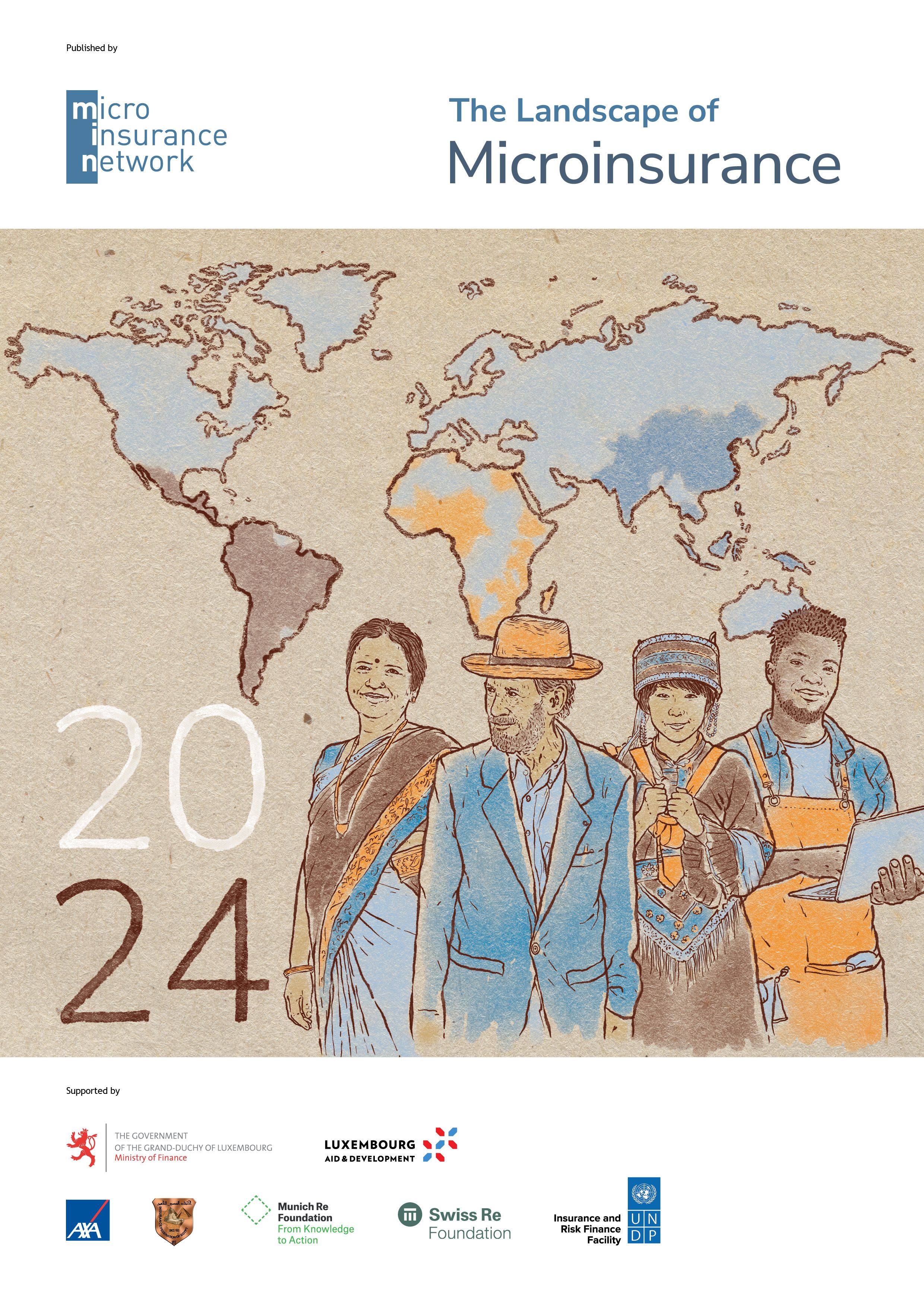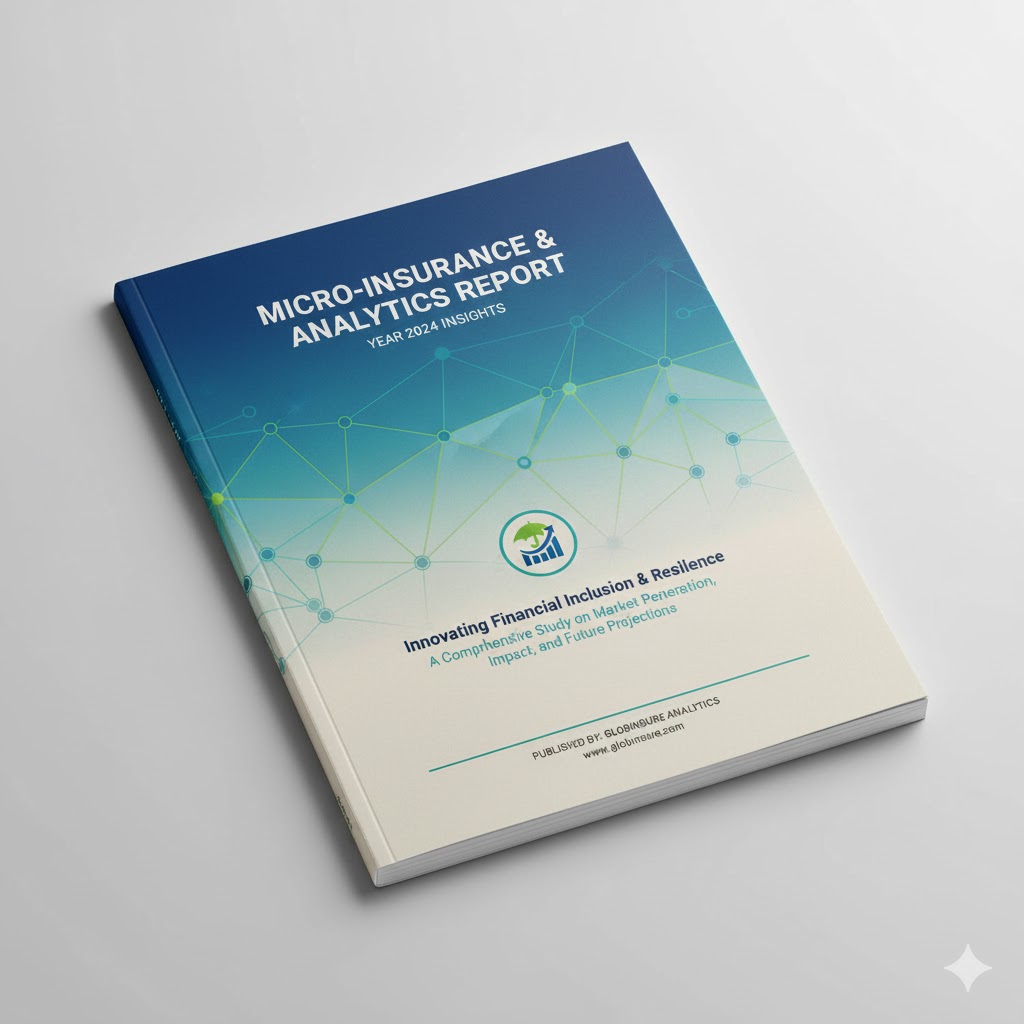Displaying 1 - 15 of 57

The Landscape of Microinsurance 2024
The Landscape of Microinsurance 2024 analyzes the growth and evolution of microinsurance, highlighting its critical role in supporting vulnerable populations facing climate shocks, crises, and financial insecurity. It covers 344 million people across 37 countries, examines regulatory frameworks, distribution channels, and subsidies, and emphasizes the need to close the protection gap while fostering long-term market development.
Date Issued
2024
Topics
Products
Region

ACRE Africa provides micro-insurance products to strengthen farmer resilience
ACRE Africa partners with insurers to offer affordable index-based crop insurance to smallholder farmers. Uses weather stations and satellite rainfall data to trigger payouts automatically.
Date Issued
2021
Topics
Products
Region

AXA MANSARD, NIGERIA – The case for insuring women for a better tomorrow
AXA Mansard, one of Nigeria's largest insurance providers, launched a focused strategy in 2016 to serve women in the retail insurance space. This initiative emerged from detailed market research identifying the unique needs of Nigerian women. AXA tailored products specifically for this segment and forged partnerships with women-led organizations to build trust and raise awareness about insurance. The case highlights practical lessons from product innovation, inclusive marketing, and collaboration as a pathway to greater gender equity in insurance.

Better Weather Protection for Tanzanian Farmers
One Acre Fund and Global Parametrics piloted an innovative weather-index microinsurance solution using the Water Balance Index for ~70,000 Tanzanian smallholder farmers. The parametric cover enabled timely payouts and improved resilience against drought and excess rain.
Date Issued
2021
Topics
Products
Region

Bringing Health Microinsurance to Kenyans via Mobile Phone
Kenya-based pilot that bundled hospital cash, digital loans, and mobile health tools to increase access and affordability. MicroEnsure piloted Fearless Health by combining hospital cash benefits with mobile-enabled digital health loans to support underserved Kenyan populations.
Date Issued
2018
Topics
Products
Region

Case brief: ALM SEGUROS
Case brief: ALM SEGUROS. This presentation introduces ALM Seguros as one of the pioneering microinsurance companies in Brazil. The company focused on delivering accessible life and funeral insurance to underserved communities, building trust through affordable premiums and simplified claims. The case illustrates how early entrants in the Brazilian market paved the way for inclusive insurance by aligning product design with local needs and regulatory frameworks.

Case brief: FASECOLDA
Case brief: FASECOLDA. This entry presents the activities led by the Federation of Colombian Insurers (Fasecolda) to strengthen inclusive insurance in Colombia. It covers efforts in financial education, technical training, regulatory engagement, and the promotion of innovative products for underserved segments. The case demonstrates how institutional leadership and coordinated action have advanced capacity building and inclusion in the Colombian insurance sector.

Case Brief: Field Accident Insurance - PROFIN Foundation
Field accident insurance – PROFIN Foundation. This case highlights a specialized microinsurance product developed in Bolivia to cover medical expenses resulting from injuries during official soccer, basketball, and volleyball matches. Distributed through sports associations, the product is tailored to the needs of amateur athletes and addresses a previously uninsured risk segment. It showcases how inclusive insurance can be adapted to community-based distribution and activity-specific protection.

Case Brief: Field Accident Insurance - PROFIN Foundation
Since 2018, Bolivia's PROFIN Foundation has offered a unique sport accident insurance for amateur football players with no medical coverage. The product is distributed through sports associations and covers players' injuries during official matches. Today it protects over 9,000 players, and has prompted other insurers in Bolivia to develop similar offerings.
Date Issued
2020
Topics
Products

Case brief: MIDAGRI
Case brief: MIDAGRI. The Peruvian Ministry for the Development of Agriculture and Irrigation (MIDAGRI) introduced agricultural insurance as a strategic policy tool to enhance the competitiveness of the agricultural sector. This led to the creation of the Seguro Agrícola Catastrófico (SAC), a public insurance program designed to protect smallholder farmers from extreme weather-related losses. The case outlines the structure of SAC, its implementation, and the government's role in building resilience through accessible, state-supported agricultural insurance.

Case brief:TUNAJALI
Case brief: TUNAJALI. "Tunajali" — meaning "we care about you" — is an inclusive e-commerce insurance initiative developed to serve low-income customers across Latin America and the Caribbean (LAC). The program leverages digital platforms to provide accessible health insurance, with a focus on simplifying enrollment and claims processes. It demonstrates how tech-enabled delivery models can overcome traditional barriers and scale protection for vulnerable populations.

Case Study: Through Rain or Drought, Crop Insurance Provides a Protective Umbrella for Us
ACRE Africa's crop index insurance enabled Kenyan smallholder farmers to recover from climate shocks. This pioneering weather-index product helped sustain productivity and manage agricultural risks by offering timely protection against drought and other climate-related threats.
Date Issued
2016
Topics
Region

Challenges of Rural Insurance in the Context of Climate Change: the Case of Soybeans
Product for low-income urban dwellers in flood-prone areas of São Paulo, offering quick post-disaster payouts.
Date Issued
2023
Topics

Climate insurance for coffee farmers
Blue Marble partnered with Nespresso to provide weather index insurance to coffee farmers. Automatic payouts based on satellite rainfall data. Coverage expanded to multiple countries.

COVID-19 and the Insurance Industry: Why a Gender-Sensitive Response Matters
COVID-19 and the Insurance Industry: Why a Gender-Sensitive Response Matters. This guidance note explores how the COVID-19 pandemic affected the gender gap in insurance access and services. It identifies four key areas where applying a gender lens can improve customer-centricity: operational practices, brand communication, product innovation, and new distribution channels. With practical insights from IFC's Women's Insurance Program, the paper offers a roadmap for insurers to better serve women during and beyond crisis periods.
Date Issued
2020
Region
